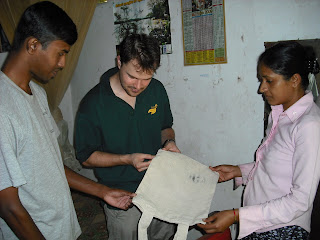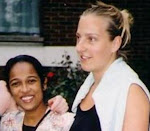 I have just returned from spending 7 days at the ECO-V field station on the edges of Udawalawa National Park. The experience was a fantastic chance to see first-hand the work done by the Pelican Project team, and to get a close look at the realities of working within a rural community.
I have just returned from spending 7 days at the ECO-V field station on the edges of Udawalawa National Park. The experience was a fantastic chance to see first-hand the work done by the Pelican Project team, and to get a close look at the realities of working within a rural community. Staying at the ECO-V field station in Udawalawa village, just outside the park, I was hosted admirably by Harsha, Mananperi, Bandara, and Ajiith. They were able to show me all aspects of the project as well as many of the local sights.
I was taken to tanks where observations on pelicans and other wildlife had been carried out by the team. These wetlands are a haven for all sorts of wildlife - particularly birds, but they are also imperative for the livelihoods of the local fisherman. This is something I was able to learn more about with a fascinating visit to a carp breeding facility run by the fisheries authority.
 Fishermen rely on a healthy environment
Fishermen rely on a healthy environmentOne thing that was never far from view was the invasive plant species lantana (Lantana camera) - seemingly around every corner. It provides a massive problem for the growth of native plant species and also reduces the available grazing for elephants.
 Lantana dominates the foliage, often growing to obstruct vehicles' access in the National Park
Lantana dominates the foliage, often growing to obstruct vehicles' access in the National Park Therefore, encouraging the growth of native plants is an important step, and the Pelican Team have been busy growing and planting saplings that will hopefully grow into suitable trees for pelicans and other birds to roost and nest in. We visited one tank where saplings were starting to take hold on the banks, and it was nice to dream that in a few decades time young pelicans could be fledging from these trees.

Seedlings in fabric bags prior to planting by a tank
 A small sapling looking strong on the shore of a tank
A small sapling looking strong on the shore of a tankThe successes of the tree-planting scheme will, like all initiatives in this area, be dependent on the community’s support - which the team has been so careful to mould.
I was able to meet a fishing family that had benefited from the provision of a sewing machine. This lady, with ECO-V’s guidance has been able to produce fabric bags as an environmentally friendly alternative to polythene. These bags are now becoming popular within the village, and are proving to be an important part of upholding the status of the project within the community.
 Investigating the handiwork
Investigating the handiworkThe foundations for the future community support are being laid through the development of the Friends of Pelicans group. Whilst in Udawalawa I attended a Friends of Pelicans meeting, which was hosted by Harsha. I was able to see how keen these young people were to be involved - another positive sign that the area is in safe hands.

Harsha with some of the Friends of Pelicans
Throughout my stay, I was struck by the level of friendly respect in which the team is held throughout the community, and it was clear that the careful, often slow, steps that have been taken to ensure local support for more eco-friendly activities have been worth the effort.
Walks around the surrounding area gave me opportunities to see the landscape that these local people live in and rely on. The waterways, the paddy fields and the plantations are all delicately reliant on many factors remaining favourable. The community now recognise the importance of saving the pelicans, and a healthy pelican population should mean a healthy wetland system and a more robust resource for the local people.
 Surviving on the land can be tough
Surviving on the land can be toughOf course, being situated on the edge of a national park offered many wildlife viewing opportunities, both inside and outside of the protected area. One morning, we went on safari within the National Park, coming close to countless elephants, saw buffaloes, monkeys, monitors, crocodiles, hornbills, bee-eaters, storks, herons, and spot-billed pelicans. It was breathtaking and unforgettable.
 One of many magnificent elephants seen on the safari
One of many magnificent elephants seen on the safariAdd visits to temples and sites of other cultural interest in the area, a swim in the reservoir, the chance to get to know the project staff better and it all combines to make a very special week - and a valuable insight into the nature of the challenges being faced and met by the Pelican Project team.








No comments:
Post a Comment